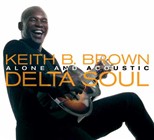Home » Jazz Articles » Album Review » Keith B. Brown: Delta Soul
Keith B. Brown: Delta Soul
Blues, as the late English critic Eddie Lambert observed, isn't pre-jazz, pre-rock, or pre-anything. It's blues. Forty years of "the future of the blues" has been a succession of modish dilutions into pap pop. This isn't what Brown wants, but in the (verbal) notes he expresses his wish that blues included more variety... well, a little more history would have told him bluesmen seldom stuck exclusively to blues. Hack work apart, some played marginal stuff of independent interest which didn't muddle their specialised blues techniques. Some played hack work on all fours with local make-do musicians, but played blues brilliantly when persuaded that was what was wanted.
Brown crosses the margin with three (all self-penned) guitar-accompanied songs and one unaccompanied song, "Niggers and Rednecks," musically on the gospel side, like "All I Need," which has some nice guitar sliding—though the words concern more a young lady than Brown's heavenly home. "Who's to Blame" is 1960s folk revival, the poorest performance; "Didn't Come Today" is standard gentle singer-songwriter fare, which does raise an issue regarding Brown's "Illinois Blues" and "Me and the Devil," intelligently reconceived from the original vocal and guitar masterpieces by Skip James (depicted by Brown as an actor in the Scorsese/Wenders film The Soul Of A Man) and Robert Johnson (Brown had the role of another master represented here, Son House, in the Johnson biopic) respectively.
As a guitarist in his young prime, Skip James swung! At slow tempos where it's nearly impossible, dammit, he swung! He was a fabulous player, and Brown does well with his music (much transcribed long ago by Stefan Grossman) and even James's vocal idiom (local to Bentonia, Mississippi, recorded also by Jack Owens). But a legitimate, maybe necessary criticism of "Illinois Blues" and "Devil" is that the guitar parts somewhat lack a rhythmic profile. Brown has worked out the music better than fine, but his playing lapses into slack folkiness at times. Not dreadfully, and not so you'd notice in a context only of his immediate contemporaries. But he should listen to early Big Joe Williams—and Louis Armstrong!
Brown's other House and James numbers are pretty good, but Blind Lemon Jefferson's "Easy Rider" is a masterpiece, the musical identity of Jefferson's composition all there, but in a Mississippi idiom up with the best old guys. On House's "Shetland Pony" the guitar part is like a more rollicking Fred McDowell, on whose own "Callin' Me" Brown's personal combination on guitar of McDowell, House, James, and others is moving and powerful very differently from McDowell himself.
It was high time fate allowed some young member of the Mississippian diaspora to play—generally very well and sometimes brilliantly—songs his grandmother (see the liner notes) knew, connecting family memory and experience into very superior music.
Track Listing
Death Letter Blues; Hard Time Killing Floor Blues; All I Need; Didn't Come Today; Niggers and Rednecks; Bad Luck Child; Cypress Grove; Shetland Pony; Callin' Me; Easy Rider; Who's to Blame; Illinois Blues; Me and the Devil.
Personnel
Keith B. Brown: guitar, vocal.
Album information
Title: Delta Soul | Year Released: 2005 | Record Label: Raisin Music
< Previous
From The Meticulous To The Sublime
Comments
Tags
For the Love of Jazz
 All About Jazz has been a pillar of jazz since 1995, championing it as an art form and, more importantly, supporting the musicians who create it. Our enduring commitment has made "AAJ" one of the most culturally important websites of its kind, read by hundreds of thousands of fans, musicians and industry figures every month.
All About Jazz has been a pillar of jazz since 1995, championing it as an art form and, more importantly, supporting the musicians who create it. Our enduring commitment has made "AAJ" one of the most culturally important websites of its kind, read by hundreds of thousands of fans, musicians and industry figures every month.


















